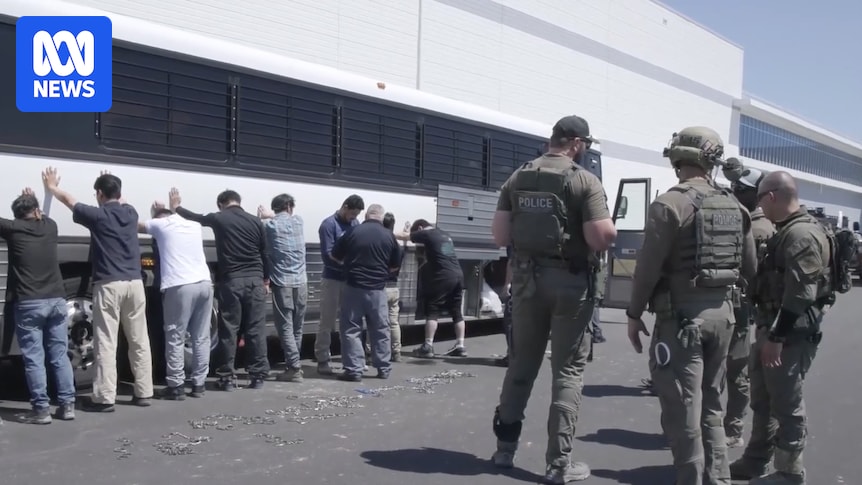
Hundreds of federal agents stormed a Hyundai car battery plant in Georgia on Thursday, detaining 475 workers—most of them South Korean nationals. This significant enforcement action is part of the Trump administration’s aggressive crackdown on undocumented labor. The factory, a flagship electric vehicle battery site, has been hailed as Georgia’s largest-ever economic development project, making it a high-profile target in a series of workplace raids.
U.S. Immigration authorities later released video footage showing workers in shackles being loaded onto buses, prompting the South Korean government to dispatch diplomats to the site. The raid, described as one of the largest single-site enforcement operations in ICE’s two-decade history, has sparked international concern and diplomatic dialogue.
The Raid and Its Immediate Impact
Video released by U.S. Immigration and Customs Enforcement depicted a caravan of armored vehicles arriving at the site, with federal agents directing workers to line up outside. Some detainees were frisked and shackled, while others had plastic ties around their wrists as they boarded a Georgia prison-transfer bus. Two workers reportedly hid in a pond before being arrested.
Among the 475 detained workers, more than 300 were South Korean nationals. These individuals were employed by HL-GA Battery Co, a joint venture by Hyundai and LG Energy Solution, or by contractors at the construction site. The plant is expected to open next year, and the raid has brought its operations under intense scrutiny.
Legal and Diplomatic Repercussions
Steven Schrank, the lead Georgia agent of Homeland Security Investigations, noted that some of the detained workers had illegally crossed the U.S. border, while others had expired visas or were on a visa waiver that prohibited employment. An immigration attorney representing two of the detained workers stated that his clients arrived under a visa waiver program, allowing travel for tourism or business for up to 90 days without a visa.
Hyundai Motors has pledged to investigate its suppliers and subcontractors to ensure compliance with regulations. As of now, none of the detained workers have been charged with crimes, but the investigation remains ongoing. An advocacy group spokesperson highlighted the difficulties faced by family members in locating or communicating with the detainees.
South Korea’s Response
The South Korean government expressed “concern and regret” over the operation targeting its citizens. Foreign Minister Cho Hyun announced the establishment of a response team and indicated the possibility of traveling to Washington for discussions. The crackdown risks straining ties between the Trump administration and Seoul, a key Asian ally and investor, especially as they navigate a trade deal involving $350 billion of South Korean investment in the U.S.
“The economic activities of our companies that have invested in the U.S. and the rights and interests of our citizens should not be unfairly infringed upon during the course of U.S. law enforcement,” said First Vice Foreign Minister Park Yoon-joo.
President Trump, when questioned about the raid, remarked, “I would say that they were illegal aliens and ICE was just doing its job.”
Background and Broader Implications
The raid resulted from a months-long investigation into allegations of illegal hiring practices at the rural site. Agents sought employment records, timecards, and visual documentation of workers. The Hyundai Motor Group began manufacturing electric vehicles at the $7.6 billion plant a year ago, employing around 1,200 people today. The adjacent plant, still under construction, was a focal point of the investigation.
Bryan County, where the plant is located, has seen its population grow significantly, with the Asian demographic increasing from 1.5% in 2018 to 2.2% in 2023, primarily among Indian descent, according to Census Bureau figures. LG Energy Solution, collaborating with Hyundai at the plant, announced a suspension of most business trips to the U.S. in light of the raid.
Looking Ahead
The Hyundai plant raid underscores the complexities of immigration enforcement and its potential to affect international relations. As the investigation unfolds, both Hyundai and the South Korean government will likely continue to navigate the diplomatic and legal challenges posed by this incident. The situation highlights the ongoing tension between economic development initiatives and immigration policies, a balance that remains a contentious issue in U.S. politics.






